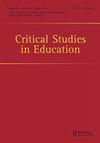Schools, separating parents and family violence: a case study of the coercion of organisational networks
IF 2.7
2区 教育学
Q1 EDUCATION & EDUCATIONAL RESEARCH
引用次数: 2
Abstract
ABSTRACT This paper considers how complex family circumstances such as parental separation, custody disputes and family violence intersect with the organisational cultures and everyday practices of schools. In particular, we are concerned with the ways that coercive control – a strategy used predominantly by men to dominate, control and oppress women in the context of intimate partner relationships – can be deployed to manipulate and coerce the organisational networks of schools into furthering abusive agendas. Informed by cultural theory and research from sociology of education, legal studies, criminology and family violence, we show how what we term the ‘coercion of organisational networks’ (CON) both relies upon and exploits systemic misogyny and gendered unequal relations of power. These issues underpin institutional strategies often used by schools to keep parents – and mothers, in particular – at a distance. When affected by separation, divorce and family violence, being positioned in problematic terms can create additional risks for women and children. We argue that without adequate understandings of coercive control as practices within a broader constellation of systemic misogyny and gender inequalities, and in the absence of organisational cultures committed to addressing these, schools are considered complicit in perpetuating family violence and its effects.学校、分离父母和家庭暴力:组织网络强制的案例研究
摘要本文探讨了父母分离、监护权纠纷和家庭暴力等复杂的家庭环境如何与学校的组织文化和日常实践相交叉。特别是,我们关注的是,强制控制——一种主要由男性在亲密伴侣关系中用来支配、控制和压迫女性的策略——可以被用来操纵和胁迫学校的组织网络,从而进一步推进虐待议程。根据文化理论和教育社会学、法律研究、犯罪学和家庭暴力的研究,我们展示了我们所称的“组织网络胁迫”(CON)是如何依赖和利用系统性厌女症和性别不平等的权力关系的。这些问题支撑了学校经常用来与父母——尤其是母亲——保持距离的制度策略。当受到分居、离婚和家庭暴力的影响时,处于有问题的境地可能会给妇女和儿童带来额外的风险。我们认为,如果没有充分理解强制控制是系统性厌女症和性别不平等的一个更广泛的群体中的做法,并且没有致力于解决这些问题的组织文化,学校就被视为长期存在家庭暴力及其影响的同谋。
本文章由计算机程序翻译,如有差异,请以英文原文为准。
求助全文
约1分钟内获得全文
求助全文
来源期刊

Critical Studies in Education
EDUCATION & EDUCATIONAL RESEARCH-
CiteScore
10.10
自引率
5.10%
发文量
18
期刊介绍:
Critical Studies in Education is one of the few international journals devoted to a critical sociology of education, although it welcomes submissions with a critical stance that draw on other disciplines (e.g. philosophy, social geography, history) in order to understand ''the social''. Two interests frame the journal’s critical approach to research: (1) who benefits (and who does not) from current and historical social arrangements in education and, (2) from the standpoint of the least advantaged, what can be done about inequitable arrangements. Informed by this approach, articles published in the journal draw on post-structural, feminist, postcolonial and other critical orientations to critique education systems and to identify alternatives for education policy, practice and research.
 求助内容:
求助内容: 应助结果提醒方式:
应助结果提醒方式:


